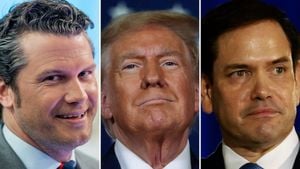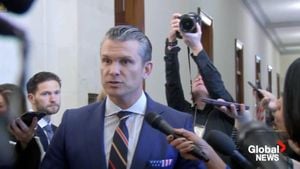With the election of Donald Trump as President again, the potential for drastic changes to U.S.-Mexico trade relations looms large. Trump has made it clear he intends to reshape the economic ties between the two countries, primarily through the imposition of high tariffs on imports from Mexico and China. Recent statements by economic experts and Mexican officials reflect deep concerns about the consequences of these policies, not just for Mexico but for the U.S. economy as well.
Mexican Economy Minister Marcelo Ebrard has been vocal about the potential fallout of Trump’s proposed tariffs, particularly the staggering 200% duty on cars imported from Mexico. Ebrard asserted, "Any action you take to put at risk the U.S.-Mexico trade relationship means thousands of companies will be impacted." He noted the numerous U.S. corporations operating within Mexico, highlighting how intertwined the two economies have become.
Ebrard's warnings resonate on multiple levels. Tariffs like those proposed could deliver a serious blow to Mexico's economy, which relies heavily on its export sector. Many popular vehicles—such as the Honda CR-V and Toyota Tacoma—are manufactured within Mexican borders before making their way north. Doubling the tariffs on these cars could lead to significant price hikes for U.S. consumers, placing financial strain on many American families.
Under the North American Free Trade Agreement (NAFTA), which has since been succeeded by the United States-Mexico-Canada Agreement (USMCA), U.S. automakers benefited from the lower labor costs south of the border. This trade framework has enabled companies like Ford and General Motors to maintain competitive pricing on their vehicles, even as consumer expectations continue to shift toward more environmentally friendly models. If Trump follows through on his tariff threats, the cost to produce cars would rise, resulting in higher sticker prices for American buyers.
The automotive sector is just one area where these economic tensions could unfurl. The broader ramifications of such tariffs could ripple through other sectors, including electronics and consumer goods, affecting the entire supply chain. Major players such as the National Retail Federation have already raised alarms, cautioning against the inflationary pressure these tariffs could exacerbate.
Trump's trade agenda is rooted deeply within his economic strategy, which mixes tax cuts with protectionist tariffs intended to revive U.S. manufacturing. His approach aims to incentivize domestic production by making imports more expensive. He has suggested reducing the corporate tax rate for U.S. manufacturers, which has sparked mixed reactions from economists. Critics argue these policies could lead to trade wars, with the U.S. economy potentially suffering as American companies find it harder to obtain raw materials and manufactured goods.
Various multinational firms, from Tesla to Honda, have already established significant operations within Mexico, see it as an integral part of their supply chains. Ebrard insisted during recent press briefings, “There’s hardly an important U.S. company without money here.” Given this established foundation, the impacts of heightened tariffs could trigger retaliatory actions from Mexico, effectively straining the cooperative trade relationship that's taken decades to cultivate.
Despite pressures faced by the U.S. to tighten regulations, Ebrard believes stringent actions against trade partners will backfire. The capacity for retaliation lies within Mexico's ability to export not only to the U.S. but globally—affecting trade balances and possibly ushering both countries toward recession. Already, competitor economies stand ready to exploit any weaknesses arising from disrupted supply chains or trade relations.
Adding to the uncertainty is how the high stakes of electric vehicle (EV) production play out. With major players like Tesla having committed to increasing production capacities via new plants, these future investments hang precariously on what tariffs might be imposed. The upcoming Tesla factory is set to boost job creation and technological advancement, but any shifts toward isolationist trade policies could lead to stalled projects or even withdrawal from planned ventures.
Looking back at history, Trump’s aspirations to renegotiate NAFTA led to escalated tensions and false promises of economic rejuvenation. His administration forged new directions, yet the volatility hindered long-term stability, as rival nations became increasingly protective of their interests. The potential for high tariffs only promises to reignite contentious debates over trade policies and reshape consumer markets.
The economic playbook suggests careful navigation of these murky waters will be required as officials gear up for negotiations and discussions to soothe investor and consumer fears. The forecast remains uncertain, but the stakes could not be higher as both nations grapple economically. Will Trump’s plan pay off, or will it sow discord affecting livelihoods across both sides of the border?



